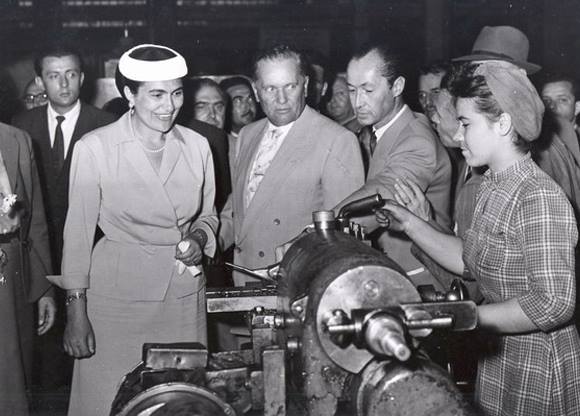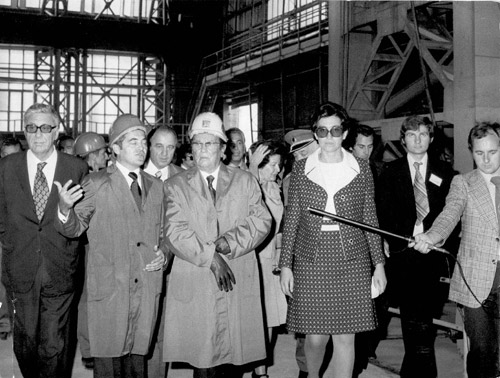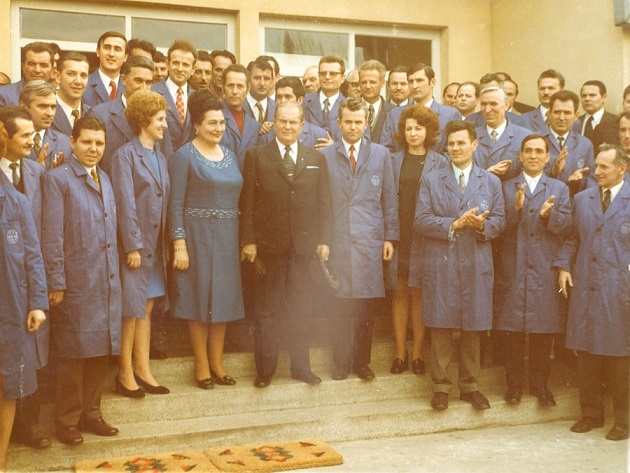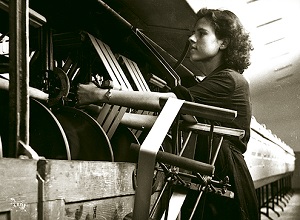
Paul Zorkine (1959)
Introduction
The Hungarian revolution of 1956, the Berlin uprising, the Polish events and, in general, the failures of stalinism in Eastern as well as in Western Europe, have brought back the question of workers councils back to the forefront of revolutionary activity.
It is not our intention to relate the history of workers councils, which already exist during the French revolution as “Conseils des communes”, during various revolutionary movements in 1848, then, during the Commune, up until the first soviet of the Putilov factory in St Petersburg in 1905, the first soviet congress in June 1917, the Kronstadt soviet against the bolshevik dictature in 1921, the “Republic of Councils” at the end of WW1 in Hungary, in Germany, in Austria, at both ends of the Adriatic: in Pola and in Cattaro, in Spain and in China, to witness a last fit, in 1956, in Budapest.
One will point out that we forget in that list the Yugoslavian workers councils.
It is not, let’s confess it right away, an oversight: for us, the creation of “workers councils” by the Yugoslavian government only represent a new mystification of the working class by the bureaucracy. Dangerous:
– for the Yugoslavian workers, for whom it compromises a revolutionary institution which had remained – until then – “clean” (one could oppose to the Party the idea of workers councils)
– for “a certain European left” that clings to the “Yugoslavian example” and the slogan of Tito’s government: “Transfer of the factories to the workers!” as the only solution still possible between capitalism and stalinism.
Which is why it is important to scrutinise the real content of the “Yugoslavian experience” and its consequences.
“Standard” of living or socialism can’t ignore the stomach
It is with the law of April 1st 1952 that the new salary system came into effect in all the economic enterprises in Yugoslavia. Until that date, salaries were fixed by governmental decree.
The creation of a new industry of equipment goods, the investments renewed annually served mostly the growth and strengthening of the bureaucratic apparatus, of the State, of the “new class”. This effort translated for the working class into a constant diminution of their living standards and consumption to roughly 4 or 5 times below the living standards, not that great, of French factory workers. For farmers, “socialist edification” meant the compulsory purchase by the State, at derisory prices, of 82% of their products. Such a policy led the country to economic catastrophe. After the breaking off between of the SKJ and Moscow, the ruling class, freed from the obligation of docilely executing the soviet directives in State’s organisation and economy, found itself obligated to make important concessions to the farmers as well as to the working class. This is how farmers reconquered the freedom to freely decide the nature of their production, and the compulsory purchase of their products was progressively abandoned.
The concession granted to the working class was the creation of factory workers councils. The official propaganda states that the workers themselves decide of the level of their salary and the distribution of the factory earnings. This workers’ participation to the management of the enterprises was to put an end to the continual lowering of the workers’ standard of living. Because here is, finally, the question: what does the government offer us as a means to get out of this miserable situation? Will “workers’ involvement in the management of the enterprise” put an end to the continuous lowering of the workers’ standard of living?

The national revenue or the inequality of the cake slices
It is the law which fixes every year the plan for the whole of the production and distribution of goods within the Yugoslavian state. It is therefore the Parliament which decides in the end, after a vague consultation of trade unions, cooperatives, etc. It is true that the plan does not set the nature and the quantities of products to manufacture, to deliver, but the “compulsory minimum use of the production capacities”. This “minimum” is for agriculture of 105%, to reach the planned production and pay for the magic chimerical transformation plan of an agricultural country into a highly industrialised one – investment: 17.7% of the national revenue – and to bring peace of mind to the new ruling classes – the army, the armament, the State’s administration: 45.4% of the net national revenue… The part for the “wage earners” in all this? Well! In the revenue produced by industry and mining, to cite only this example, it is only 14.9%. This part is fixed in advance by the plan which, outside of the “minimum use”, fixes the global pool of salary to be spent for this level of use. The first elements to determine the salary pool are the production rules and the optimum personnel: how many employees and workers are iessential to “run” the enterprise at X% of its production capacity?
By fixing in advance the level of use of enterprises, the state determines the quality and volume of the production.
By fixing the global pool of salaries, he State ensures that the consumption and standards planned for the employees will not be exceeded. Within this global pool, the employees share it within themselves as they see fit and arrive docilely to a sort of auto-exploitation and, even, self-punishment (we quote “Borba”):
“The global pool of salaries (the sum paid to the whole of the staff) will be diminished by each non justified work absence… This means that the whole collective must stand against those of its members who will try to diminish the global salary pool by creating unjustified costs”.
The whole Yugoslavian working class should transform into “pointeau”, warden, overseer. Because the key word is: “Lowering the production costs” or, rather nastily “we will not share the gains with the lazy!”. Indeed, the salaries are fixed in such a way that they enable employees to satisfy their most elementary needs. But these salaries being only a part of the income of a wage-earner, one holds out the possibility to receive the second slice, taken from the global pool. It is the yearly statement of account of an enterprise which must show the part of everyone into the sharing of gains. The simplest way to achieve an increase in the profitability of the enterprise is to lower production costs and increase the productivity of every worker. In reality, all these measures happen to the detriment of the worker, worsening the conditions in which he works and asking for an ever increasing effort, physical as well as psychological. Especially, when the road between the production chain and the directing offices where the benefits are “shared” is long… Long, and it passes through the State coffers which cover the “social contributions” by taking from enterprises gross revenues. By “social contributions” we mean not “national insurance and such” but ALL of the spending planned by the State to cover the costs of administration, the army, and investments. Before, then, being able to receive the second slice of their salary, as in “their share of the companies’ profit”, Yugoslavian workers have to generate by the sale of their products: the amount of their salary and the amount of their contribution to the State’s coffers in the form of “social contributions”. It is evident that enterprises work out their prices, “social contributions” included. Can we allow ourselves to offer competitive prices (the Yugoslavian market is a free market) within which is included such a heavy cost? The risks of a bad economic climate, the Yugoslavian worker shares it with his employer – the State – or, at the very least, with the Finance minister whom he becomes complicit with… if we believe the law of April 1st 1952?
What is certain is that the more technically advanced an enterprise is, the more higer its percentage of costs and the more its workers’ collective will find itself in the obligation to diminish the salaries pool, if it wants to be competitive. This trick by the Yugoslavian “Communists” to force factory workers to lower their wages is picturesque enough! What do our Western “Titoists” think about this?
And the added value?
Well! It changed its name… This is called in “socialist” Yugoslavia the “State’s slice”. Here it is: frank and precise. The new added value created by labour are divided in 2 slices: salaries pool (the workers’ slice) and the added value (the State’s slice). Besides, the enterprise, completely bereft of financial means, is effectively controlled by the State, and its assets are only numbers in the accounts of the State’s bank. If the law of April 1st 1952 pretends that the workers have a role in the management of the country’s industrial capital, it cannot hide that they have no say in the management of the financial capital, which totally dominates the former. And the participation of the State in the sharing of the added value created by the unplanned production increases is controlled by a special tax, which an enterprise that exceeds its minimum production must pay. A sinking fund guarantees the renewal of equipment and, in case the plan does not foresee it, the enterprise must create its own investment fund, reserve fund and social fund.
The net profit only starts after having sufficiently contributed to those funds… after having given to the State what the State asks for in “social contributions”.
DESPITE HEAVY PRESSURE, IT HAS NOT BEEN POSSIBLE FOR THE YUGOSLAVIAN RULING CLASS TO OBTAIN THOSE REVENUES UNDER THE PURELY BUREAUCRATIC DIRECTION OF PRODUCTION. IT IS THROUGH THE “WORKERS COUNCILS” THAT THE YUGOSLAVIAN BUREAUCRACY MEANS TO ENSURE THE DESIRED REVENUES AND THE COMPLICITY OF THE WORKING CLASS.

“Factories to the workers”
Therefore here are the fundamental principles on which rest the Yugoslavian workers councils – we summarize:
profitability: no economic enterprise can live from public subsidies, but on the contrary it must be able to cover via its income all of the running costs and pay to the State the targets of the plan.
Profit-sharing: the workers and employees working in an enterprise must be interested in its success, meaning the amount of their salaries must be determined by the profitability of the enterprise.
How we gave “the factories to the workers”
All enterprises are property of the “People” (read: of the State), The “people” who works there does not have any rights upon the enterprise, the government can remove its hands off at any time under any excuse of “public interest”. So, a worker can be fired from “his” enterprise – and even the whole of the employees (including the workers council). The workers council working in an enterprise is there only to keep it “running” under a number of “sine qua non” conditions:
1. amortization of machines and equipment (or restitution),
2. acquisition of new tools of production, buildings, means of production, equipment (investments),
3. State property must therefore grow every year,
4. pay all the taxes prescribed by the State,
This proves that in the “Titoist” system and under cover of the “workers councils”, OWNERSHIP OF THE MEANS OF PRODUCTION IS KEPT SEPARATED FROM THE PRODUCERS and that, to speak clearly, YUGOSLAVIAN WORKERS ARE STILL WAGE-EARNING EMPLOYEES. They can neither dispose of the means of production, nor of the fruit of their labour, nor steer the production, nor decide the mode of distribution.
Without those four factors, for us, there is no socialist economy.
Enterprises management
The Yugoslav system differentiates from traditional State capitalism in terms of “workers’ co-management”
An economic enterprise is, in principle, led by “workers councils”, ie by the entire staff that works there. All these individuals have the same rights in the accomplishment of their tasks as members of the council, whatever theirwork in the enterprise and regardless of the level of their salraries. Yes, all – which is very democratic – EXCEPT THE DIRECTOR. Because it is him, the Director, who decides even of the composition of the “workers council”, insofar as IT IS HIM WHO EMPLOYS AND SACKS THE STAFF. So, all of the staff can be changed during the course of the year but, legal trick, the council does not cease to exist and is comprised of staff working at any given moment in time. The central point stays the Director, he reason for this being simple: it is him – and not the council – who represents the owner of the enterprise: The State. We cannot better qualify or define the role of the director than the law itself:
“The Director leads production and all the affairs of the enterprise. The workers and staff are responsible in front of the Director of the accomplishment of their task. The Director represent the enterprise towards the state and the other enterprises” (Law fro june 18 1950, article 8)
The Director is a member of the management committee but, something rather curious, the law places him above this committee:
“If the Director finds that a decision by the management committee does not correspond to the law, to legal requirements and TO THE ORDER OF THE COMPETENT STATE AUTHORITIES, he is obliged to immediately alert those authorities and to suspend the execution of the management committee’s decision while until that the competent state organism takes the definitive decision” (article 40 of above law)
It must be understood that THE DIRECTOR IS NOT THE COMMERCIAL MANAGER NOR THE TECHNICAL DIRECTOR OF THE ENTERPRISE, which could have just about justified his power. According to “Borba” (official newspaper of the SKJ in issue dated: 13/2/52), out of 763 directors of economic enterprises in Yugoslavia, 186 had some technical knowledge, but 702 were active members of the SKJ. Which explains many things and compels this newspaper to defend them against the reproach of incompetence, of uselessness for the enterprise.
“All those directors have well understood that THEIR ESSENTIAL DUTY is to be faithful to the Party and that the authority of the State has named them to these posts mostly to reward the militants and the fighters they have been…”
“Borba” states that “the authority of the people” has a need for such directors, as “they are the best guards of possessions” which this “popular authority” owns. But, as a guard is not sufficient, we have reinforced the security with the presence of he “economic police” in each enterprise. It is this presence of police squad which gives Yugoslav factories an air of barracks (or of prisons, which is only slightly different). It is the police which enforces rules, discipline and immediate execution of the directors’ orders. In front of each Yugoslav factory is a policeman. Even the “lefty” Western tourists cannot possibly not see it. What they don’t see is an “apparatus of internal security” that Yugoslav workers called in their slang, the “tzynkarosh” (rat, snitch), one must know the worker’s attitude towards “the good socialists” and also his mentality and political concepts. This type of surveillance was the task of the SKJ members working in the enterprise. But they are not numerous enough and rarely possess the technical knowledge to check iwhether a worker is “sabotaging” the work. To ensure this task, the State’s economic board seeks persons able at this type of work within the members of the collective. There exists specialised technical colleges where the Tzinkar are trained. They are not therefore miserable little informers like as we have in Western factories, but a real institution, well organised, with technical training – a sort of non-commissioned officers of the industry. Besides having the privilege of a guaranteed employment (in some enterprises their number has increased up to 10% of all employees!) the “Tzinkars” are put forward in priority onto the lists of candidates for the workers councils...

Here are the conditions in which the collective elects every year the workers Council, composed of 15 to 120 members (in enterprises with less than 30 workers and staff, the collective in its entirety constitutes the workers council). Its role? According to the law it:
1. Approves the base plans and the final account of the enterprise,
2. validates the conclusions relating to the management of the enterprise and the realisation of the economic plan,
3. states the rules of the enterprise with approval from the competent State’s body
4. performs the division of the part of accumulated capital, being available to the enterprise
The ordinance number 45-280 dated February 22nd 1945 instituting the “Comités d’entreprise” in France, gives the following definition of its social and economic role:
“The enterprise committee ensures or controls the management of all social works… must be consulted on questions concerning the organisation, the management and the general running of the enterprise… must be informed of the profit made by the enterprise and can put forward suggestions as to how they could be used…”
But we don’t want to make comparisons. Our goal was to dismantle the myth of the Yugoslav “Workers Councils”, which a certain left takes for a model of a revolutionary institution. We want, based on the facts invoked, to state that workers cannot control the management of the economy without disposing of the essential rights of freedom of speech, of meeting, of organisation: THAT THE IDEA EVEN OF WORKERS COUNCIL IS INCOMPATIBLE WITH THE EXISTENCE OF THE STATE APPARATUS; that – each time we have tried to make the two coexist (State – workers council) – it was never the State who “withered” but, on the contrary it was the State that absorbed the Councils,
What is left of them in Yugoslavia?
